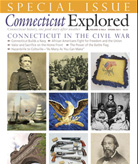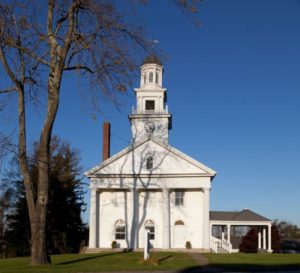 The Peace Movement in Litchfield
The Peace Movement in Litchfield
By Julie Frey Leone
(c) Connecticut Explored Inc. Spring 2011
Subscribe/Buy the Issue!
By the middle of the 19th century Litchfield had evolved from a bustling commercial center into a pastoral hilltop town. With the closest railroad station seven miles away, industry had moved to Torrington, Winsted, and Waterbury along the Naugatuck River. The majority of Litchfield’s 3,200 residents ran small agricultural and dairy farms or operated shops along West Street. Old photographs from the time show clapboard buildings along wide dusty roads. The names on many of the shop signs trace back to the founding families of Litchfield.
The peace of this historic community was shattered with the tumultuous start of the Civil War.
Residents were hardly unanimous in their sentiments toward the war. Some residents advocated for peace and were quickly labeled “secessioners” or “copperheads,” terms used to label Northerners with pro-Southern sympathies. Their arguments for a peaceful solution to the conflict were anathema to the majority, who quickly denounced any dissenting opinion as unpatriotic and traitorous.
Tempers flared in August 1861 when a white flag symbolizing opposition to the war was spotted hanging outside the home of Andrew Palmer, just north of Litchfield in Goshen. A group of five men was elected to speak with Palmer about lowering his flag. Their efforts proved in vain. The flag appeared again the next morning.
According to the Litchfield Enquirer, a group of 100 men assembled in front of the Congregational Church in Goshen and marched toward the Palmer property. The flag was removed before the mob arrived. The crowd demanded the flag be turned over. Palmer refused and was arrested. He was taken before a local justice of the peace and signed an oath promising to refrain from flying peace flags. To address the problem of war dissent, on September 1, 1861, Governor William Buckingham issued a proclamation outlawing the display of peace flags.
Less than a year later, a peace convention was organized in Morris (a town that itself had “seceded” from Litchfield in 1859 to form its own government.) A platform was erected on the property of Morris Ensign, and the outspoken peace proponent Reverend Ellis B. Schnable was scheduled to be the event’s key speaker. The rally was disrupted when Schnable was arrested on a federal warrant just after he spoke. We learn from a Litchfield soldier’s letter home what became of Schnable. Alva Stone of Litchfield, who joined the 8th Connecticut Regiment in October 1861, wrote to his wife Lucy on November 17, 1862:
I see by the paper that “Schnable” of “Peace Meeting” notoriety is figuring in the rebel army in Arkansas and so he at least has found his proper place while his audiences are deserting the cause of the rebels and trying to creep back into decent society—What has become of your peace men that use to congregate in your village and hold forth evenings?
Townspeople responded by forming the Litchfield Vigilance Committee, which appears to have consisted of rowdy young men who used the veil of the committee to intimidate residents they viewed as unpatriotic. One incident recounted by Esther Thompson, then 10 years old, involved the Palmers (no direct relation to Andrew Palmer), an elderly couple from Litchfield. According to Esther, Mr. Palmer was an outspoken “copperhead.” One night a group of 40 or 50 men tacked an American flag to the font of the Palmer house and the bullied the Palmers into signing an oath of allegiance.
Even the most prominent of Litchfield’s citizens was not free from scrutiny. In an incident that garnered state-wide attention, Dr. Josiah Beckwith, a well-respected medical physician of Litchfield and acting president of the Connecticut State Medical Society, was accused of providing drafted soldiers with medical exemptions from military duty in exchange for money. He answered his accusers in an editorial in the Litchfield Enquirer, stating, “we regard it a solemn and responsible duty which devolves on military surgeons, to muster none but proper men into the Federal Service… the reports of Hospital Surgeons and the medical press have shown the disasters which have resulted from mustering men having ‘Hernia, Varcicle, Heart and Chest diseases.” Though no criminal charges were brought against Beckwith, his participation in the medical screening of military soldiers was suspended in August 1862.
Articles from the Litchfield Enquirer, which from June 27, 1861 to February 13, 1862 had closely monitored and denounced the peace movement in the county, suddenly stopped appearing. From that point forward the town maintained a united front in favor of the war.
The mythology of the Civil War holds that citizens of the North were uniformly pro-Union. History reveals a different story. While the peace movement of Litchfield may have been short-lived, it provides an important reminder of the disparity in public opinion during the first few turbulent months of the Civil War.
Julie Frey Leone was curator of the Litchfield Historical Society.
“Peace.”
Several “Peace Meetings” have lately been held in some of the western towns of this County. Meetings ostensibly for peace, with a great cry of peace, but held under such suspicious circumstances and controlled by men of such well-known tendencies and sentiments that they have thought to be but the flimsy disguise which is used to cover the pitiful efforts of traitors, of whom our County has a small sprinkling.
And the suspicious of the patriotic become tolerably well grounded when at the “Peace” meetings,–the placid and plausible agent of the Bridgeport Farmer appears, pencil in hand, and “takes the opportunity” to solicit subscriptions to that treasonable sheet, than which none is more rank secessionist and traitorous, north or south of Mason and Dixon’s line. In fact, respectable people are beginning to believe that “Peace” meetings are gotten up for the special purpose of aiding that treacherous and dying sheet, not to speak of the placid and plausible agent.
We give these meetings the benefits of this gratuitous notice now, merely to put our friends …on their guard.
Litchfield Enquirer, July 11, 1861. Litchfield Historical Society
EXPLORE!
Read more about Connecticut in the Civil War in the Spring 2011 and Winter 2012/2013 issues, and on our Connecticut at War TOPICS page.

